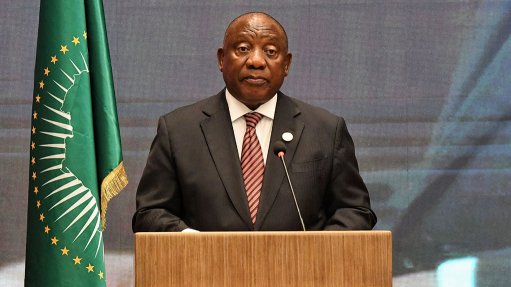
President Cyril Ramaphhosa
President Cyril Ramaphosa said on Monday that ending the gender wage gap must be a priority for all social partners, especially government, business and labour, if South Africa is to achieve an equal and just society.
On Wednesday the world will celebrate International Women’s Day, which Ramaphosa said was a day to celebrate achievement and progress, “but it is also a day to focus on what must still be done to achieve equal rights and opportunities for women”.
He outlined that the economic empowerment of women was an important pillar in the country’s struggle to end gender-based violence (GBV) and femicide.
“At the centre of this effort is the economic empowerment of women. We must tackle the many challenges that stand in the way of women’s full participation in economic activity,” he said.
Ramaphosa explained that it had been recognised that unequal access to resources and economic opportunity made it more difficult for women to escape situations of abuse and violence.
He called on men and women across society to strengthen the fight against GBV.
“At the same time as we develop business opportunities, we need to ensure that women and men receive equal pay for work of equal value. Across the economy, women are paid on average less than their male counterparts doing similar work. Ending the gender wage gap must therefore be a priority of all social partners, especially government, business and labour, if we are to achieve an equal and just society,” said Ramaphosa.
He said South Africa must overcome the idea that a woman’s place is in the home. Ramaphosa noted that even women who have jobs are often expected to do housework and childcare, making it more difficult for them to find employment, earn a decent wage, be promoted or start a business.
He noted that from the beginning, government must ensure that girls and young women have equal access to education and an equal chance to succeed.
He highlighted that South Africa must shift economic power into the hands of women through, among other things, earmarking 40% of all public procurement for women-owned businesses.
To achieve this, he said government had been providing training to women entrepreneurs so that they could tender for government work and successfully provide the goods and services that government needed.
To date, government has provided training to more than 6 000 women-owned enterprises.
MORE OPPORTUNITIES
Last month Ramaphosa announced during his State of the Nation Address that the Industrial Development Corporation had earmarked about R9-billion to invest in women-led businesses. Other entities including the Public Investment Corporation and the National Empowerment Fund have also committed to establish special purpose vehicles to support women-owned businesses.
The President explained that there were other areas where government was working with partners to improve the economic position of women.
He said the Presidential Employment Stimulus had provided work and employment opportunities to more than a million people since it was launched in 2020. Of these more than 60% were women.
Similarly, of the 140 000 small-scale farmers to whom government provided vouchers to buy seeds, fertiliser and equipment, 68% were women.